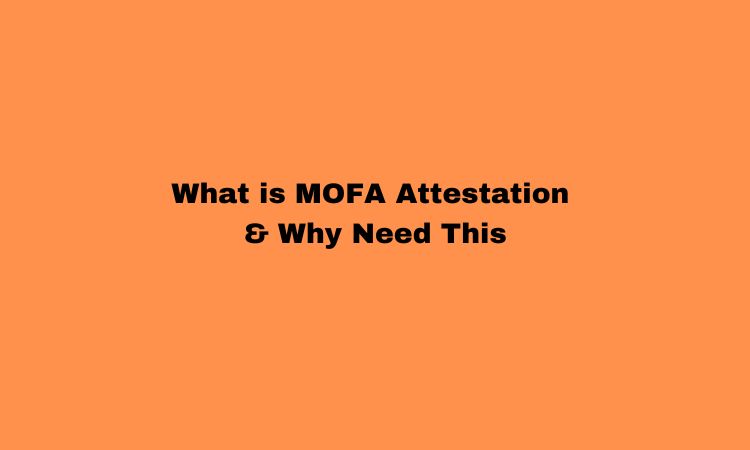What is MOFA Attestation & Why Need This

When venturing into the realm of international affairs, one often encounters a labyrinth of bureaucratic processes and formalities that can be daunting.
Among these procedures, MOFA attestation is a critical step that plays a pivotal role in ensuring the authenticity of documents when dealing with foreign governments and organizations.
In this comprehensive guide, we’ll delve into the intricacies of MOFA attestation, exploring what it is, why it’s necessary, the procedures involved, and more.
What is MOFA Attestation?
MOFA, or the Ministry of Foreign Affairs, is the principal government entity responsible for handling a nation’s foreign affairs and diplomacy.
MOFA attestation, therefore, is the process of verifying the authenticity of legal and official documents, ensuring they are valid and credible for use outside the issuing country.
Why is MOFA Attestation Necessary?
- Ensuring Document Authenticity: MOFA attestation is vital to confirm that documents are legitimate and have not been tampered with. This assurance is crucial when dealing with foreign governments and institutions, as they need to trust the veracity of the documents they receive.
- Legal Recognition: Many countries require MOFA attestation to recognize foreign documents as legally binding. This is especially true for documents related to immigration, employment, education, and business transactions.
- Preventing Fraud: MOFA attestation helps prevent fraudulent activities, such as using fake documents to secure visas, job opportunities, or other benefits in a foreign country. It acts as a safeguard against such malpractices.
- Standardization: MOFA attestation creates a standardized and universally accepted process for document validation, making it easier for foreign entities to understand and accept the documents.
- International Agreements: Certain international agreements and conventions necessitate MOFA attestation for cross-border recognition of documents, such as the Hague Convention Abolishing the Requirement of Legalization for Foreign Public Documents.
Types of Documents Requiring MOFA Attestation:
- Educational Documents: This includes certificates, diplomas, and transcripts, which are often required for admission to foreign educational institutions or for job applications.
- Commercial Documents: Business-related documents, such as contracts, invoices, and trade licenses, may need MOFA attestation when engaging in international trade and commerce.
- Personal Documents: Personal documents like birth certificates, marriage certificates, and police clearance certificates may require attestation for immigration, marriage, or employment purposes.
- Legal Documents: Legal documents, such as powers of attorney, affidavits, and court judgments, may need attestation for legal proceedings or property transactions in a foreign country.
The Procedure for MOFA Attestation:
The process of MOFA attestation can vary from one country to another, but the following steps offer a general overview:
1. Document Verification:
Before MOFA attestation, the documents must be validated by the issuing authorities in the home country.
This could be the educational board, notary public, or relevant government department.
2. Attestation from Local Authorities:
After local verification, the documents must be submitted to local government authorities for further authentication.
These may include district authorities, state departments, or chambers of commerce, depending on the document type.
3. MOFA Attestation:
Once the local authorities have attested the documents, they are forwarded to the Ministry of Foreign Affairs.
The MOFA will review the documents and, if deemed genuine, attach their seal and signature.
4. Embassy or Consulate Attestation:
In many cases, the attested documents must then be presented to the embassy
or the consulate of the destination country in the home country for their verification.
5. Attestation Fees:
Throughout this process, there will be fees associated with each step of attestation.
These fees vary based on the type of document, the country of origin, and the destination country.
6. Submission of Documents Abroad:
After completing the attestation process in the home country,
the documents are ready to be sent to the relevant authorities in the foreign country.
7. Foreign Ministry Attestation:
In the destination country, the documents may need to undergo further attestation
by the foreign ministry to ensure they comply with the country’s regulations.
8. Translation and Notarization:
If the documents are in a language other than that of the destination country,
they may need to be translated and notarized to confirm the accuracy of the translation.
9. Endorsement by Other Entities:
Certain documents may require additional endorsements from specific authorities or organizations.
For instance, educational documents might need verification by the Ministry of Education in the destination country.
10. Final Submission:
The fully attested and endorsed documents are then ready for submission to the intended recipient,
such as an educational institution, employer, or government agency in a foreign country.
Challenges and Considerations:
- Time-Consuming Process: MOFA attestation can be a time-consuming process, involving multiple steps and government agencies. It’s essential to plan ahead to avoid delays.
- Changing Requirements: Attestation requirements can change, so staying informed about the latest regulations is crucial.
- Costs: The attestation process involves various fees, which can add up, so budgeting for these expenses is important.
- Language Barriers: Dealing with documents in a language you don’t understand can be challenging. Translation and notarization services may be required.
Conclusion:
MOFA attestation is a pivotal step in the realm of international document validation.
Its significance in ensuring document authenticity, legal recognition, and preventing fraud cannot be understated.
As you navigate the complex world of international affairs, understanding the procedures and requirements for MOFA attestation is essential.
By following the necessary steps and adhering to regulations, you can ensure that your documents are not only credible but also readily accepted by foreign governments and organizations, making your international endeavors smoother and more successful. dohaj



